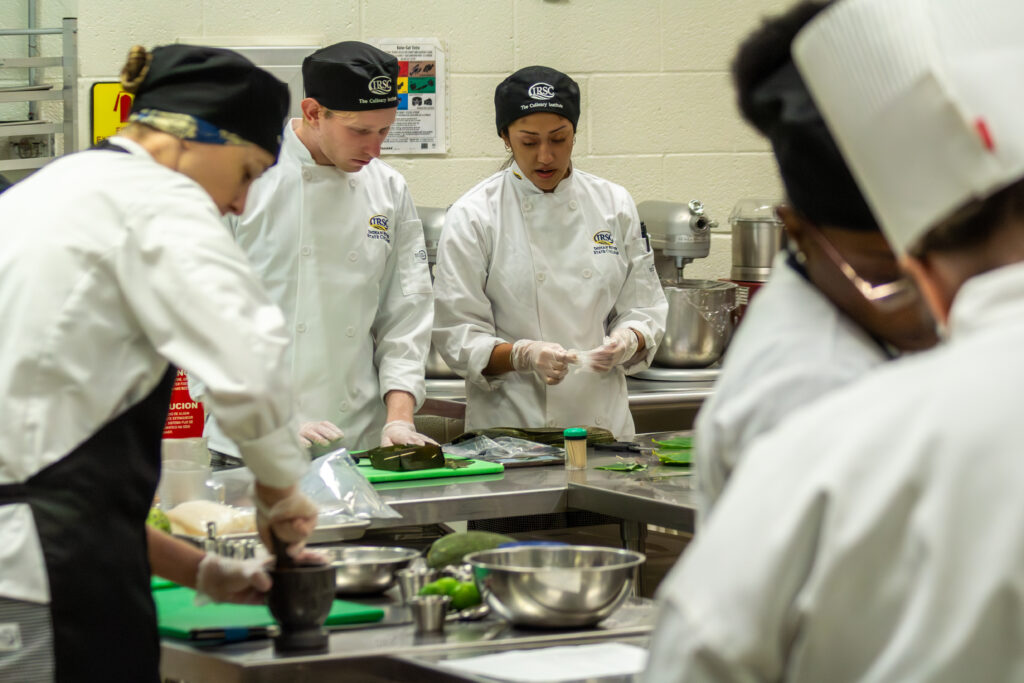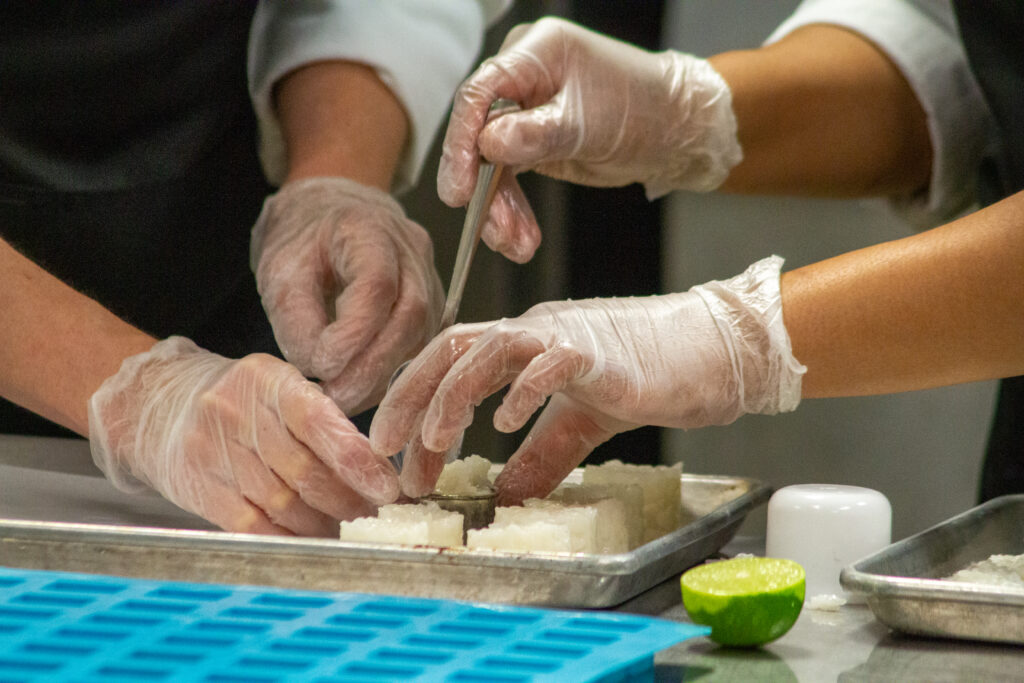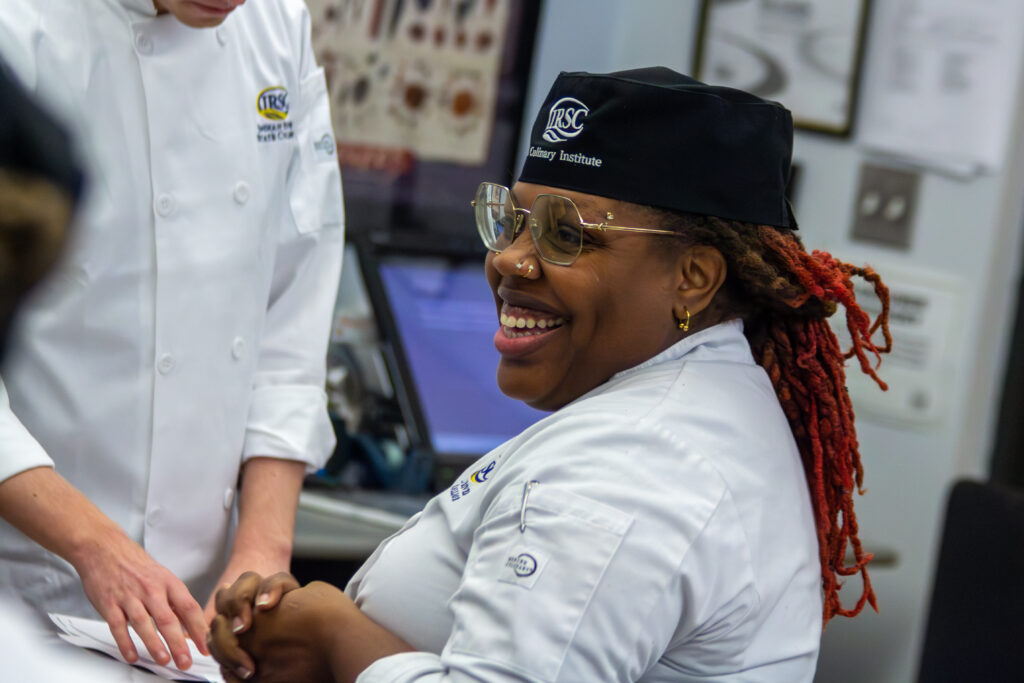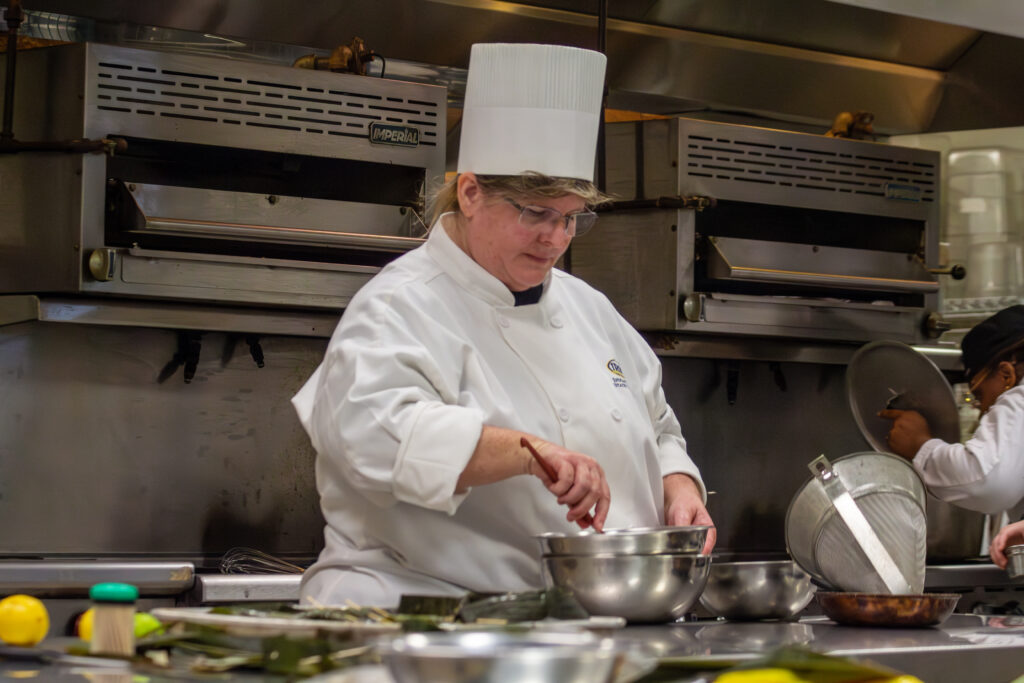Florida welcomed a record-breaking 143 million visitors in 2024 – nearly 3 million more than the previous year. But here’s the challenge facing the Treasure Coast and beyond: 76% of hotels nationwide are experiencing critical staffing shortages, with housekeeping being the most urgent need.
The hospitality industry is booming, but it desperately needs trained professionals. That’s where Indian River State College comes in.

Building the Pipeline
In a recent episode of RiverTalk on IRSC Public Media, host Kathleen Walter sat down with Professor Deborah Midkiff, chair of the Hospitality and Culinary Management Department, along with students Megan DiPietro and Emily Day. Their conversation revealed how The River is addressing the workforce gap right here on the Treasure Coast.
“I think a lot of times people feel that what we do only happens in the classroom with our students, and that certainly is a big piece of it, preparing them for the workforce,” explained Professor Midkiff. “But another piece of that is, how do we connect all the pieces of the pipeline?”
That pipeline starts as early as middle school, exposing young students to hospitality and culinary careers. It continues through partnerships with local high schools, connections with employers seeking great talent, and even pre-apprenticeships in the area.

More Than Just Cooking and Serving
Many people think hospitality education is limited to learning to cook or serve tables. The reality is far more expansive.
Indian River State College offers a two-year AS in Hospitality and Tourism Management, covering food and beverage, special event management, lodging, and travel and tourism. Some students have gone on to work with the county tourism board. The college also offers a degree in Culinary Management, where students learn not just cooking techniques but the leadership skills to become future sous chefs and executive chefs.
One standout program is the Culinary Apprenticeship – an “Earn While You Learn” initiative. It’s a one-year, tuition-free program where students work 40 paid hours per week in restaurants that cook from scratch, rotating through stations under highly skilled chefs.
Recently, Indian River State College reinvigorated its two-year Restaurant Management degree for students specifically interested in the restaurant side of hospitality, without the lodging component.

Real Students, Real Success
Megan DiPietro came to Indian River State College after working at and managing a coffee shop. “I didn’t really know what I wanted to do,” she recalled. When she discovered the culinary management program, she realized it combined two things she loved: working with food and management.
Now working at Sweet Desires Bakery, Megan sees how her education translates directly to the workplace. “The program gives you a base, a nice foundation for wherever you go to work,” she said. “Even when I went into working at the bakery, I had very little experience with that. But I was able to hit the ground running.”
Emily Day was drawn to hospitality because of her experience in food and beverage and managing personal estates. “I just kind of saw this degree option and thought that it was a good opportunity to kind of broaden my understanding of hospitality and the options that it offered,” she explained. In addition, Emily completed a summer internship at Chef’s Table Restaurant in Stuart and now has a position with them working with special events and catering.
What Employers Really Want
Indian River State College meets quarterly with an advisory board of industry professionals from restaurants, hotels, and even medical facilities that need hospitality workers. Their consistent message? Soft skills matter most.
“We’ve continued to hear soft skills,” Professor Midkiff noted. “What we’re really narrowing it down to is communication skills, teamwork… time management, prioritization are key things that they’re looking for.”
These skills are woven directly into the curriculum and reinforced through extracurricular events where students take on leadership, planning, and visionary roles.

A Booming Job Market
The employment picture for hospitality graduates is encouraging. According to Professor Midkiff, average hotel wages have increased 26% since the pandemic. “I’ve seen more of our students over the past three or four years being in positions where they can get promoted into better positions faster,” she said. “Instead of waiting for those opportunities 10 or 15 years, I’m seeing a lot of our really sharp students move into leadership roles within one or two years.”
By 2033, the Bureau of Labor Statistics projects that one in eight new jobs will be tied to hospitality or leisure.
The Technology Factor
Technology is reshaping the industry, but not replacing workers – it’s changing what workers do. From robotic vacuums for housekeeping to AI helping managers with paperwork and predictive analytics, technology is removing some of the physical burden and making professionals more productive.
“AI is not going to take over our jobs, but people that understand how to use it are going to be the ones that get hired for the position,” Professor Midkiff emphasized. The industry will see less blue-collar work and more white-collar, IT-focused, better-paying careers.
Beyond Stereotypes
Hospitality and culinary careers extend far beyond front desk clerks and line cooks. The industry needs IT professionals, finance and accounting experts, scheduling systems specialists, and as virtual reality becomes more prevalent, even more white-collar positions.
Students notice evolving trends too. Emily observes that while some guests want the convenience of mobile check-ins and online payments, others still crave face-to-face personal connections. “There’s still that need for face-to-face personal connection,” she noted.
Megan sees changing tastes in food: “Everyone loves that bright color, the bright flavor… They want things that are simple and just have this nice bright flavor, not so sweet.”
Advice for Future Students
Both students had encouraging words for anyone considering the field.
Emily emphasized the versatility: “There’s just so many options in it. You’re not going to be narrowing yourself into anything too specific… It just gives you a really good baseline education.”
Megan’s advice? “Work a summer job and see if you like it. Then take the leap and apply for a program. Even if you don’t end up using the skills you’ve learned and going into a full-time career in whatever path you choose, it’s still skills that you will take with you for the rest of your life.”
The holiday season is upon us – a time when the hospitality industry shines brightest. Behind every perfectly executed meal and seamlessly managed event are trained professionals like Megan and Emily, who’ve turned their passion into careers at The River.